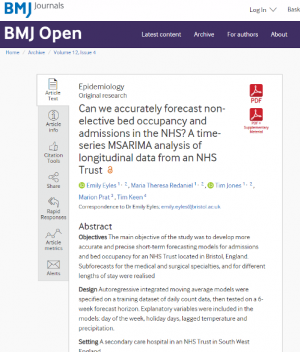Improving how hospitals forecast unplanned admissions
15 July 2022
Researchers working with North Bristol Trust have been able to improve predictions of unplanned admissions at Southmead Hospital.
The team, led by National Institute for Health and Care Research Applied Research Collaboration West (NIHR ARC West) researchers at the University of Bristol, looked at the number of unplanned hospital admissions reported by North Bristol Trust between September 2016 and March 2020.
They found that they could improve forecasts of admissions 95.6 per cent of the time, compared to the standard approach used to predict admissions.
Accurate forecasting of short and long-term demand for hospital beds is important because unplanned admissions place undue pressure on staff and services. Knowing precisely how many people might be admitted into hospital benefits both those working and those being treated there, because it limits cancellations and improves patient flow.
This study divided data by length of stay and specialty rather than by how severe or urgent cases were. It also used additional information such as weather conditions and temperature to improve accuracy. Days of the week and holidays were also included, as other studies had found that these affected unplanned admissions.
The team tried to predict both admissions — the number of patients admitted on a particular day — and bed occupancy — the number of beds occupied by patients between admission and discharge over a 45-day period, called a ‘forecasting horizon’.
They found that predicting surgical admissions and stays of under 48-hours was more difficult and that their forecasts became less accurate the farther forward in time they went. Predicting bed occupancy was also more difficult than predicting unplanned admissions because of how much harder it was to forecast how long a patient would stay in hospital once they had been admitted.
The research team also believes that the pandemic may have had an impact on hospital admission patterns and that data from that time should be used carefully in forecasting models. In fact, modelling might need to be adjusted because of the changes brought about by the pandemic.
More work is now needed to see if the models tested during the study can still be used despite the pandemic changing how hospitals work and how care is provided. The researchers are working with North Bristol Trust to re-calibrate the forecasting model post-COVID and looking to bring the model into operational use later in 2022.
Dr Theresa Redaniel, Applied Data Science Team Lead at NIHR ARC West, said:
“Making accurate predictions about the number of unplanned hospital admissions is critical to the day-to-day functioning of a hospital. It improves patient flow and reduces pressure on staff and services.
“The results of our study show that admissions forecasting models used by NHS Trusts may not necessarily be as precise as the methods we propose and we hope that our study will encourage further developments and improvements in this field.”
Paper
